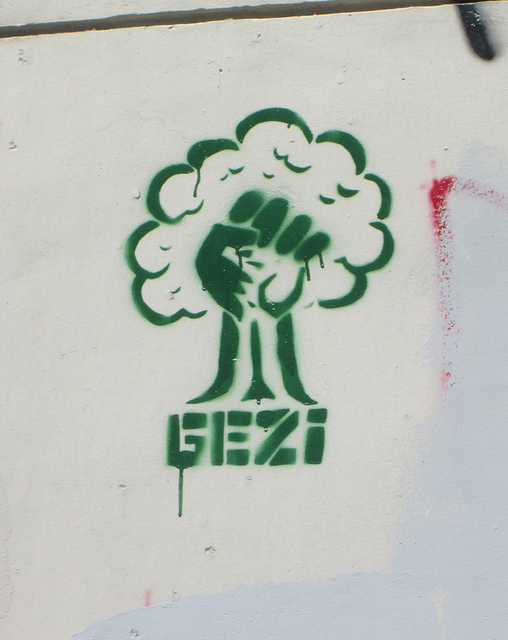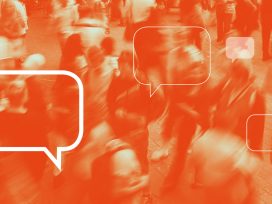In recent months, those people who opposed the policies of the government (or should we say of the “one man” at the head of the government?) were dismissed by that “one man”, who claimed to represent the “national will”, as “vandals, plunderers”. The same politician gave a supremely ironic performance, addressing the crowds using phrases such as “in the past those people belittled you as empty-headed, belly-scratching folks”; and when those people asked for the resignation of those responsible for the brutal police intervention in the demonstrations – the interior minister, the governor and the Istanbul chief of police – he retorted with “since when have the feet become the head?”

Occupy Gezi. Photo: h saal. Source: Flickr
The answer to this demagogical question points to the definition of true democracy. If in Turkey, someone from the Kasimpasa district – one of the formerly lower class neighbourhoods with a reputation for its hoodlums and pickpockets – an imam-hatip lycée graduate, who spent four months in prison for a provocative public speech and was temporarily banned from political activity, occupies the post of the prime minister for ten years, as the head of the governing party he founded, then the feet have indeed become the head. Democracy, which etymologically means the form of government where the individuals who comprise the people have equal rights to sovereignty, is exactly this: the political system where even those belittled as “empty headed” or “rabble” can become the “head”.
Of course, when words are used not because they mean something to the author, but as a cliché, the content is neglected in favour of the wrapping.
As in all organizations, there is a division of labour in government and its institutions; minis-tries and local administrations are examples of this. Therefore, the person at the head of the central government cannot act as the sole decision-maker and make declarations that influence and exert pressure on all institutions of the state about all kinds of issues on the local and national agenda – ranging from the judiciary to the press, from sculptures to opera buildings, from city parks to the location of new bridges, from the number of children families should have to the appropriate places for religious worship (for people who have different religious beliefs and rituals). If one of the basic rules of democracy is the exercise of equal voting rights, another is “separation of powers”.
Political parties and NGOs constitute, together with the media, a system of social critique from one election to the next. However, this is a controlled system. It is possible to control the media organizations through their bosses (who are suckled by state) and this is exactly what has happened for the last decade. The emergence of TV shows hosted by “three wise monkeys” and the “His Master’s Voice”-style of newscast, the tragic-comical cases of auto-censorship, the exclusion of dozens of critical commentators from TV-broadcasts and news-paper columns: all this indicates the success of this control strategy. Local, national and global NGOs are more difficult to eliminate. Attempts are made to subdue them by any means available to the police. This means pushing democracy out of the ballot box and into a funeral box, as it is said.
Furthermore, “the box” can also be manipulated to a great extent. Once you seize the majority in parliament, there are no limits to the level of manipulation you can engage in, no infringements you cannot get away with under all sorts of pretexts, in a society devoid of an established history and culture of democracy. For decades there has been talk of amending the (un-fair and undemocratic) statutes regulating political parties and elections, but no parliament has yet shown both the will and the ability to do so. When candidates for parliament are hand-picked by the small group that has taken up the reins of political power (the prime minister and party chief, plus his close circle), and not elected by the people (demos), whose proxy is invoked instead; when, furthermore, the votes cast for minor or regional political movements are simply disregarded as a result of the requirement to acquire a minimum of ten per cent of the vote: then we end up with exactly the kind of parliament we have today, in which the MPs of the ruling party vote against their own draft law, while the opposition, whether by design or accident, vote for it. This is how laws enacted in parliament are made: whether or not MPs, in their capacity as lawmakers, represent the interest of their electorate, that is, “the national will”, or the will of those who wish to determine the candidates for the next general election soon becomes clear.
If we were to take the argument one step further, we would have to consider which national or global powers the political leaders – who determine the selection of future MPs and hence hold sway over the shape that legislation takes – owe their allegiance to. Then we realize that democracy, which on paper gives individuals equal rights of sovereignty, is nothing but a hollow package enabling the takeover and delivery of that sovereignty by and to certain interest groups. At least this is the case in Turkey.









